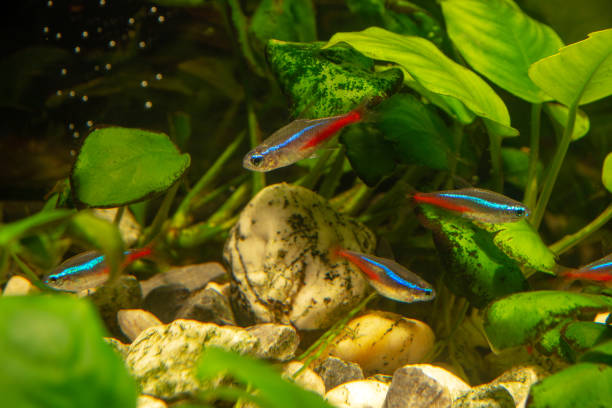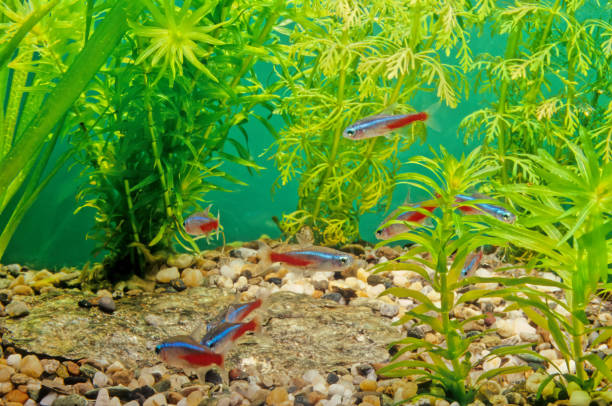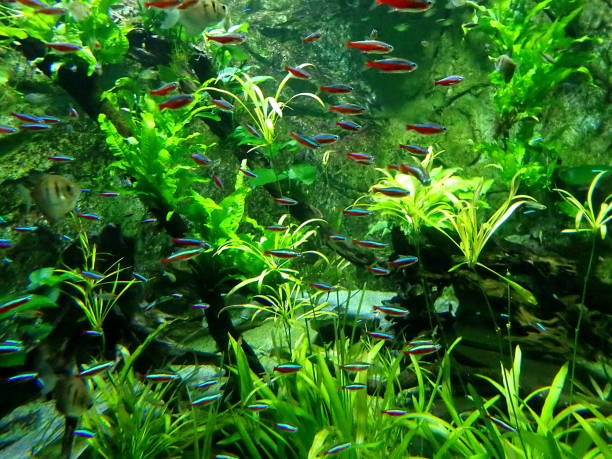Why Is My Neon Tetra Swollen: Causes, Treatment & Prevention
Neon tetras are amazing aquarium fish. They’re easy to care for, and a lot of people love them. But it can be confusing when one suddenly just becomes swollen or bloated. In this article, we explain the causes and symptoms of swelling among neon tetras and also discuss the prevention and treatment in these types of cases.
There are a lot of reasons why a neon tetra might become swollen, and it can stem from different issues. Sometimes the fish may be experiencing something called bloating or ascites, which is when fluid collects in the abdomen (the area between the pelvic fins and stomach). The cause could also be some type of infection, as well as constipation or even diet problems.

Table of Contents
5 Common Causes of Swelling in Neon Tetras
To discuss even further, here are some of the most common reasons as to why your neon tetra is swollen:
Parasitic Infection
One of the main reasons that neon tetras can get bloated is because they get infected with some type of parasite or illness. This can happen when water conditions are poor, and sick fish start to mix in with healthy ones. The parasite will then invade the bloodstream, causing inflammation and fluid accumulation in the fish’s body.
If your fish has developed parasites, they may expel their eggs in the water and cause them to swell. Parasitic infections can vary a lot in severity, so it’s important to bring your neon tetra in to see a vet if you think something is wrong. If your neon tetra is showing signs of swelling, there’s a good chance that they have parasites living on them. Check their water quality carefully for any clues – like algae growth or changes in the shape of fish cells – and treat any infected fish promptly if found.
Overfeeding
Another common reason that neon tetras become bloated is that they’re overfed. When fish eat too much food, their stomachs expand and the excess gas becomes trapped inside the body. This can cause any number of problems – from bloating to heart enlargement – so it’s important not to give your fish too many snacks throughout the day.
If you notice that your fish is eating a lot more than usual, consider cutting back on their food intake until the swelling subsides. A diet high in fiber (like plants or vegetables) may also help to avoid this type of problem.
Constipation or Diarrhea
If your neon tetra is having trouble passing water, it may start to get bloated as a result. This can be caused by several factors – like improper diet, lack of fresh water, and unhealthy bacteria in the fish’s aquarium – so it’s important to check things out and address any underlying issues if they occur. If diarrhea is causing your fish to balloon up, they may need antibiotics to clear the infection.
Physical Injury
Sometimes, a fish’s bloated appearance is simply a sign that they’ve been physically injured which can be caused by hitting another fish or object in the tank. Fish imprisoned in bubbles of gas can become quite large and unwieldy, especially if there isn’t an easy way to release them. If your neon tetra has any cuts or visible swelling from the injury, treat it as soon as possible to prevent further damage and ensure their recovery.
Too Much Garlic Ingestion
Like many other animals, neon tetras love to eat garlic. If your fish accidentally ingests too much of this allium, they may become bloated as a result. This vegetable is notorious for causing bloating in many different fish species, including neon tetras. Garlic can irritate their stomach and intestines, which leads to gas build-up and eventual bloating. If you notice that your fish is eating a lot more than usual or has begun to bloat up noticeably, try giving them an Epsom salt bath or changing their diet to a garlic-free one.

How Can You Tell If Your Neon Tetra Is Swollen?
If you notice that one of your neon tetras is swelling up noticeably, there are a few things you can do to check and see if the problem is caused by any of the above factors.
First, take note of how much food your fish is eating. If they’re taking in far more than their body needs, it might be indicative that they’ve eaten something poisonous or bloat-causing. If you suspect that your neon tetra is bloated from some outside source, the best way to check for this is by looking at their skin. If it’s swollen and red, there’s a good chance that they have parasites living on them. You can also try taking a look at their body shape – if it looks noticeably different than usual, there might be something wrong with their internal organs.
If the swelling is due to parasites, you might notice that the fish’s skin is red and inflamed. If leeks or garlic ingestion is causing the problem, you might see your fish with a greenish hue to their scales as they start to get bloated.
When Is a Swollen Neon Tetra Not Normal?
As mentioned above, most of the time swollen neon tetras are due to parasites, but there are other reasons why they might look different than usual. For example, if your fish is pregnant or has a condition that causes them to store water in their body, they may develop swollen bodies as a result. Additionally, certain medications can also cause swollen bodies in neon tetras – so always make sure to check with your vet before treating your fish. If a swollen neon tetra does not fit within one of the above categories, it’s important to take them to a veterinarian as soon as possible.

How to Treat a Swollen Neon Tetra?
- Keep them warm – A hot water bottle or bath can help to soothe their skin and alleviate any pain.
- Elevate their tank temperature – If they’re in an area of the tank that’s cold, raising the temperature can help to speed up the healing process.
- Apply a topical anesthetic – This will dull the pain and make it easier for your neon tetra to heal without discomfort.
- Place them in a hospital tank – If the swelling is too severe, you may need to treat them with antibiotics or visit a fish hospital for further care.
- Keep your neon tetra’s water clean – Cleaning the tank regularly will help to remove any potential toxins or pollutants that might be causing your fish problems. Also make sure to check for signs of ammonia poisoning, which can also lead to swollen fish.
- Seek professional help – If your fish is showing any of the above symptoms, it’s important to get them checked out by a veterinarian as soon as possible. Treatment for bloated tetras typically involves giving them fluids and medications to help drain their bodies depending on the underlying cause, this may involve surgery or even euthanasia in extreme cases. Always make sure to follow your vet’s instructions carefully when treating your fish – if anything goes wrong during treatment, they could end up dead.
How to Prevent Swelling in Neon Tetra?
- Healthy diet – Feed your neon tetra a high-quality and well-balanced diet. While neon tetras are omnivores, they do better with a diet that is mostly made up of fresh vegetables and fruits.
- Keep water conditions clean – Making sure all of the tank’s equipment is cleaned and replaced regularly can also help reduce the chances of fish getting sick, including swelling due to parasite infestation. Dirty water will give these organisms a place to thrive, so it’s important to keep everything as spick and span as possible.
- Don’t overcrowd – Avoid overcrowding your fish tank. Overcrowding can lead to stress and can also encourage the excess accumulation of bodily fluids.
- Provide your neon tetra with a lot of swimming space – Don’t let them live in one small corner of the tank! Providing them with plenty of room to swim means they’re less likely to get stressed or injured and will be healthier overall. If you do notice your neon tetra is starting to swell, don’t panic!
- Hiding spots – Provide enough hiding spaces for your neon tetra. This will help them feel safe and secure, which in turn may reduce their tendency to exhibit swollen behavior.
- Make sure all tank mates are healthy – One of the most common reasons why one fish gets sick and another stays healthy is due to their environment and diet. If you have more than one kind of fish, make sure they’re all eating well-rounded diets and that there are no diseases or parasites in the tank. This will help to keep your neon tetra healthy and free from infection.